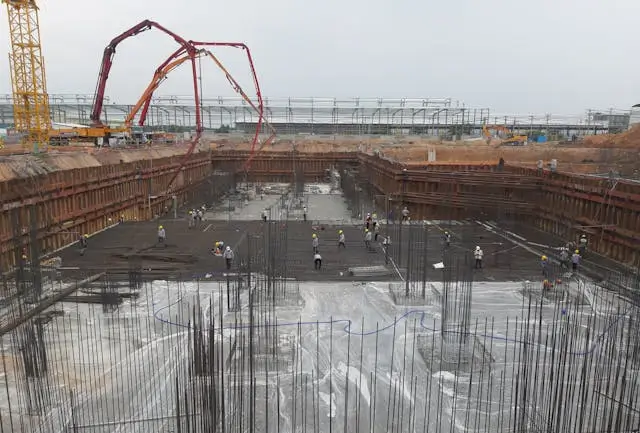Successful property management, whether residential, commercial, or industrial, relies heavily on a strong foundation. This foundation is not merely the concrete and steel that support the structure but also the dynamic relationship between two crucial disciplines: civil engineering and property management.
Civil engineers design and build structures and systems, while property managers maintain these buildings and ensure they’re safe for tenants. A collaboration between these two fields results in well-built buildings that are easy to manage. It also helps property owners save money, attract tenants, and protect their investments.
So, how exactly do civil engineering and property management work together? Let’s explore.
1. The Role of Civil Engineering in Property Development
Civil engineering plays a pivotal role in every stage of property developmentproperty development, from initial site selection to building construction. Engineers assess the site, considering factors such as soil conditions, topography, and access to utilities.
They then use the data from this analysis to guide their design and ensure the building’s foundation is robust enough to withstand the stress of the environment. Engineers are also responsible for developing essential infrastructure like roads, parking lots, drainage systems, and utility networks, ensuring seamless connectivity and efficient property operation.
Today, most property owners and tenants are environmentally conscious. Civil engineers ensure the integration of green building principles into the development process. They incorporate rainwater harvesting systems, solar panels, and high-performance insulation to minimize the project’s environmental impact and maximize energy efficiency.
Innovative solutions, like earthquake-resistant structures or green roofs, improve the lifespan of buildings and make them more functional. Reinforced concrete foundations, for example, ensure buildings can handle heavy loads over time.
2. Property Management: Beyond Maintenance
However, for properties to last and serve their purpose well, they need excellent property management servicesproperty management services. A property manager’s core responsibility is to foster positive interactions with tenants by addressing their concerns promptly and ensuring their overall satisfaction.
Strong tenant relations make it easier for property managers to schedule repairs, inspections, and upgrades. But it doesn’t end there. Compliance with safety and legal regulations is another key task, protecting both tenants and owners.
A well-managed property can retain tenants longer and maintain its market value. For example, regular maintenance of HVAC systems prevents costly breakdowns and ensures energy efficiency. When property managers are proactive, they maximize the value of structures built with care by civil engineers.
3. Where Civil Engineering Meets Property Management
Civil engineering and property management will always overlap in property development projects. Civil engineers design properties with long-term use in mind, while managers oversee operations and maintenance to ensure those long-term goals are met.
This partnership ensures buildings are functional, safe for the inhabitants, and easy to maintain. For instance, engineers may plan for easy-to-access plumbing systems, making repairs more straightforward for managers.
In turn, property managers can provide feedback to engineers on tenant needs, such as adding more green spaces or improving parking designs. This collaboration creates a seamless balance between construction and management, ensuring well-built and well-maintained properties.
4. Case Studies: Synergy in Action
A property owner buys land to develop a multi-family housing complex. The land has uneven terrain and poor drainage, posing challenges for construction and long-term maintenance.
A civil engineering team designs a solution that includes grading the land and installing a sustainable drainage system to prevent water pooling and erosion.
Once construction begins, the property management team works closely with the engineers to ensure the drainage system is accessible for routine maintenance. They also collaborate on selecting durable, low-maintenance materials for shared spaces like pathways and parking lots, reducing future upkeep costs.
This partnership resolves the land’s initial challenges and ensures a well-maintained property that attracts tenants and keeps operational costs low. Such collaborations demonstrate how integrating civil engineering and property management can lead to successful, sustainable projects.
5. The Future of Civil Engineering and Property Management
The future of these fields lies in sustainability and smart technology. With the rising pressure to meet the 2050 net zero scenario2050 net zero scenario, engineers are investing in renewable materials and energy-efficient practices to meet these environmental goals.
Property managers are adopting smart security, lighting, and climate control systems, improving tenant experiences. Interdisciplinary teams will be crucial as markets demand innovative solutions to complex challenges. For example, integrating solar panels into building designs requires ideas from both teams to ensure that it meets the tenants’ needs.
6. Choosing the Right Property Management Services
Selecting the right property management partner is essential for success. Look for a team that understands engineering considerations, such as structural integrity and sustainable practices.
Given the evolution of property systems, the partner should have experience in maintaining smart home technology and energy-efficient designs.
They should also have a good track record in handling tenant communication and conducting regular property checksproperty checks to ensure compliance with regulations. Remember, choosing a knowledgeable property manager can help protect your investments.
